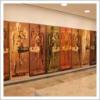By Whitney Hale
LEXINGTON, Ky. (March 1, 2021) — While debate on immigration policy rages on across the country, the University of Kentucky College of Arts and Sciences Passport to the World initiative will explore the topic of xenophobia with a lecture by historian and award-winning author Erika Lee. The free public talk, “Immigrants Out: The History of American Xenophobia,” will be presented 4 p.m. Thursday, March 4, via Zoom.
Lee’s talk, which is also being presented as part of UK's Women’s History Month programming this March, is based on her 2019 book “America for Americans: A History of Xenophobia in the United States,” an American Book Award winner and









